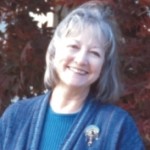topic: NEW FRONTIERS medium: TEXT
“Success is to be measured not so much by the position one has reached
in life, as by the obstacles which have been overcome while trying to succeed.”
–Booker T. Washington
“Freedom is more than crossing a border; freedom is a journey of the heart.” In 1936, the German town of Hamburg couldn’t have known the resilient life that was being brought into the world just then and there. But without needing its permission, such a life was begun. But just months later while still an infant, then-Annemarie Clausen was taken into state custody after being repeatedly left at home with her two young brothers by their alcoholic mother. From thenceforth, she was a foster child. She and her brothers were separated, and she was moved from home to home, living with families who were mandated by Hitler to take in either a foster child or a soldier. The moves took their toll, Annemarie recalls: “I was a very, very angry and hateful child.” It was a rough start for a woman who would come to define graceful resilience.
Just before the first grade, Annemarie began staying with the Winkler family. They were poor, and survived off of rations from the government. Mrs. Winkler would often manipulate the numbers on the ration coupons, adding zeros in an attempt to acquire more food. She would send Annemarie into town with her falsified documents, rattling the nerves of a young girl who knew she would be beaten by her foster mother if she refused. Mrs. Winkler would often lock Annemarie in closets or the basements without food or water. Her quieter and more civil husband would sneak Annemarie food and drink, and seemed to be Annemarie’s only ally in a dark and broken childhood. The partnership was brief, however, as Mr. Winkler was soon forced into battle and never made it home. Grieving from the loss of her husband, Mrs. Winkler’s anger grew.
It wasn’t the beatings that Annemarie remembers as being so hurtful, but rather the words her foster mother would use to tear her down. “She nearly broke my spirit,” she recalls, “Day after day she would convince me how worthless and much of a good-for-nothing I was. How I could never amount to anything. If my mother was worthless, then the apple surely could not fall far from the tree. I was convinced that I was a bad seed.”
When rumor spread that the Russians were coming to invade their town, Annemarie and Mrs. Winkler fled. When they returned, they found a town in ruins and completely absent of humanity. Memories of the sound of the large Russian tanks driving over cobblestone resonate still. As an eight-year-old, Annemarie climbed into a tall tree with a slingshot, ready to “take care of the situation” as she was determined to scare off the mammoth tanks with her small, Davidian weapon.
During her teenage years, Annemarie remained a ward of the state, attending nursing school at the German government’s expense. But it was during this year that Annemarie began to consider her fellow students’ desire to make it to West Germany. It wasn’t that she had suddenly become aware of the hardship and wanted to flee. Escaping was simply an adventure to be had for a girl who never took “no” for an answer. And so in true Annemarie fashion, she became determined to cross the border at whatever the cost.
She purchased a train ticket that traveled within East Germany, a route that was legal for her to make. What Annemarie knew, however, was that the route crossed Berlin, a city that was a gateway to the West. What she didn’t realize was that the train would be locked upon arrival in Berlin, and that all passengers would have their papers checked before any de-boarding could occur. “I guess my story didn’t check out, or maybe I got red in the ears,” she recalls with her German accent, “but because I was so young, the authorities bought me a ticket home.” Now faced with a defeat, her resiliency sprang into action and gave her motivation to try again.
A year later, Annemarie boarded another train to Berlin, this time paying a ten cent fee that allowed family members of passengers to accompany relatives onto the train during boarding time to bid them farewell. Instead of de-boarding, Annemarie hid on the train and made it to Berlin. Upon arriving in the gateway city, she and her fellow runaways attempted to swim across the Spree river to the West side. They were spotted by townspeople, who warned them to turn back before they would be shot. While they did indeed turn back, Annemarie recalls feeling no fear, explaining slowly, “At that age, there was nothing to lose, nothing to gain. When you have family, you know, you don’t want to disappoint your family. But for me, there was nothing. There was no fear. It was just adventure.”
The adventure continued one year later as Annemarie, now eighteen and again accompanied by fellow runaways, traveled to an area in Berlin of deserted row houses. These abandoned buildings were built so close to each other on both sides of the border that one could walk from one side to the other on the rooftops. The determined teenagers broke into an apartment building on the East side and climbed into the attic before making it to the rooftop. Hiding behind chimneys until the way was clear, the kids broke through an attic window in a building on the West side and climbed inside. They were now on the West side of Berlin. But a steel door separated the attic from the building below, and for a third time, Annemarie had tried to cross the border but had failed.
With unstoppable determination, Annemarie attempted to cross the border, once again, in 1955. This would be the fourth time this young girl had attempted to personally defy an authority that said it couldn’t be done. Once again, standing on the East side of Berlin, she had an idea. “I saw this florist. I went in there and I bought just the biggest bunch of flowers you ever saw.” Annemarie continues, “I ran up to the Brandenburg gate, to this guard, with this huge bunch of flowers. I was a pretty girl, good figure. I told him that my brother was getting married in a church just down the way and that I was late. I didn’t have any papers, but I guess he believed my story. He let me through.”
Annemarie had made it. She had no papers, no money, no food, and only the clothing on her back. She recalls, “So right away, I ran to the police station and I said, ‘Here I am.'” She was taken to a refugee camp, a place she actually remembers with great fondness. It was here that she first experienced true compassion and generosity. She was shown a room of clothing where she could pick out whatever she needed. The United States had donated the clothing, but she felt no gratitude. During the war, she had been told that America had bombed Japan just to try out their weapons, and as such, she had no respect for the country that she would later call home. Regardless, she accepted the clothing gladly and stayed at the camp for several months before being flown to her birthplace in Hamburg. Although she never knew her biological mother, she claimed to have family there in order to have a plane ticket provided for her to go home.
Once in Hamburg, nineteen-year-old Annemarie reported to government authorities as instructed, but was told that she could not live by herself. She remembers, “I thought, ‘You’ve got to be kidding me! You haven’t been telling me what to do for years. I’m in the West now and I’m on my own.” Annemarie was sent to a home operated by nuns, a place she remembers as being kind, yet too restricting for a free spirit such as herself. So one night, the runaway ran away once more; she tied her bedsheets together into a rope which she threw out the window and climbed down to complete independence.
She was now free and alone. Annemarie was essentially homeless for two years, hitchhiking across Germany, living in cars and abandoned buildings. She couldn’t get a job because she didn’t have documentation, papers that were held by her guardian, the government of Communist Germany.
Eventually, a restaurant gave her a job even without documentation. It was here that she met John Timmons. He was an American solider. He spoke no German, she spoke no English, and so the two drew pictures for each other to communicate. But she still had no interest in Americans, and she certainly didn’t need anyone to take care of her. And so she took off again, running away without a care until an unfamiliar feeling came upon her: she missed him. For the first time, Annemarie felt what it was to care for someone deep enough to feel sadness in their absence. It was in this season that Annemarie received a letter from John, in English, which she had translated. To her jubilant surprise, it was a proposal for marriage.
Annemarie Clausen became a Timmons in 1958, and a year later came to America. The United States was full of newness for Annemarie, who was then pregnant with her first of five children. She began to learn English by watching Captain Kangaroo, and worked nights as a waitress to make ends meet. The next few years would add more members to the dynamic Timmons family as the woman who never knew a mother became a mother to five and later, a grandmother to nine. Years would pass and trials would continue to come, but Annemarie would remain a resilient and courageous woman who is a master of making lemonade out of life’s lemons.
Annemarie Timmons is a woman who has learned how to forgive, and forgive, and forgive, only to be hurt again and yet offer forgiveness once more. On any given weekend, she can be found visiting her children and grandchildren across the country, savoring the union of family that she never got to experience as a child.
To this day, Annemarie has retained her German citizenship, and is a legal immigrant to the United States. She continues to hold onto her culture, playing the accordion at occasional German festivals and birthday celebrations. But more significant than her cultural hobbies are the lessons she has taken from her past. Only recently has she begun to write about her story, a narrative that will no doubt provide inspiration for many who continue to face the obstacles of life.
Annemarie is a woman whose life has no simple summary. She is a woman who has understood hardship more than any should have to bare, who has braved conditions more severe than few would dream, and who has found a life few are blessed enough to experience. Perhaps her ability to move beyond her shattered past is best summarized by her favorite quote by Ralph Waldo Emerson: “What lies behind us and what lies before us are small matters compared to what lies within us.”







Comments are closed